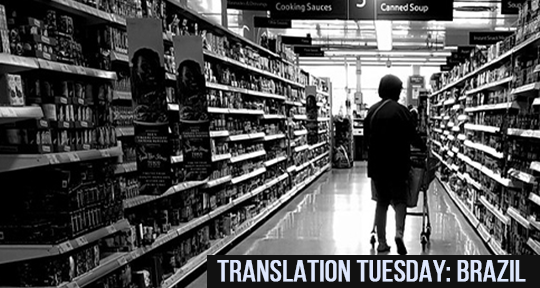For this week’s Translation Tuesday, Luca Argel spins a simple observation into a theory of relation and attachment. Trafficking in clichés that are made vivid by honest prose, this piece of micro-fiction outlines an order of love in what is often considered an extremely sterile place, devoid of culture: the supermarket. For the narrator, the simple task of prioritizing food on a shelf based on the date it was produced or purchased leads to a revelation about duration and relationships. It is not often that fiction so accurately represents the metonymic understandings that are developed at young ages by considering relations between things and people. Argel’s writing suggests that metaphor is alive and well in the mind of a child; and these metaphors stay with us as comforting touchstones throughout our lives.
I’ve enjoyed supermarkets a lot more ever since I left my parents’ house. I remember my mother telling me that they always place the almost-expired products in the front, and the newer ones in the back. I always thought that this was a universal truth: “all supermarkets have a policy of storing newer products in the back and older products in the front, so customers grab the older ones first.” But that’s not always the case. Today, for instance, the peas on the back of the shelf have the same expiration date as the peas on the front of the shelf. Generally, in the canned goods section, this rule doesn’t apply. But it does in the bakery section; in the bakery section, it never fails! You always need to look for the fresher products, for the ones that will last longer. When we got home, my father would arrange the groceries like that: recently purchased food went to the back of the pantry, while everything that had been there for a while came to the front. At a certain point in my childhood, I began to suspect that my parents had met at a supermarket. One day, she was looking for the freshest heart of palm; he was in the aisle behind her, looking for the freshest mayonnaise, and when they got to the back of the shelf, they realized that the shelf didn’t have a back, one looking right at the other.
Translated from the Portuguese by Daniel Persia
Luca Argel was born in Rio de Janeiro in 1988 and has been living in Porto since 2012. Singer, songwriter, and poet, he holds a degree in music from UNIRIO and a Master’s in Literature from the University of Porto. Luca has released three albums and has collaborated on numerous soundtracks for television and theatre. He has published six collections of poetry in Brazil and Portugal, one of which was translated into Spanish in 2015. His most recent collection, Fui ao inferno e lembrei-me de ti (I Went to Hell and Was Reminded of You), was just published by Averno (Lisbon) in September 2019.
Daniel Persia is a writer and translator currently based in Curitiba, Brazil, where he serves a Regional Leader for the US-Brazil Fulbright Commission and Editor-at-Large for Asymptote. Working primarily from Spanish and Portuguese, his research explores new frameworks for translating Afro-Brazilian/Black Brazilian literature. Prior to moving to Brazil, he earned a Master’s in Education from Boston College and taught at the Boston Arts Academy, Boston’s only public high school for the visual and performing arts. His most recent translation, Writings, by Basque sculptor Eduardo Chillida, was published in April 2019 for the re-opening of the Chillida-Leku museum in Hernani, Gipuzkoa, Spain.
*****
Read more on the Asymptote blog:

